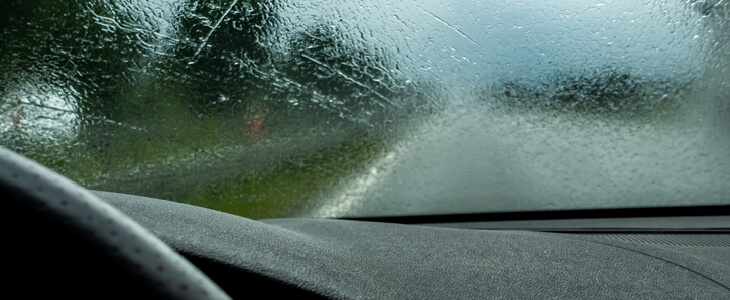Most drivers understand the risks of driving in poor weather, and adjust their behaviors accordingly to keep themselves and others safe. Unfortunately, not everyone takes such precautions. While bad weather may increase the likelihood of an accident, negligence is usually to blame. These wrecks can be catastrophic and cause serious injury or death to innocent victims.
If you or a loved one were involved in a bad weather accident, you may be faced with substantial medical bills, missed time from work, and painful recovery. But you have the right to pursue a personal injury claim to help get your life back to normal. Chatham Gilder Howell Pittman can help.
Why Is Bad Weather So Dangerous To Drive In?
The answer may seem obvious, but there’s a good reason to ask the question. Following a bad weather accident, it will be up to the victim to explain how the other driver failing to account for or properly adjust to the exact conditions that existed. The mere presence of bad weather is not enough to prove another driver was at fault. Consider, first, some of the various weather conditions that in combination with negligent driving may lead to a wreck:
- Snow
- Ice
- Rain and flooding
- Fog
- Wind
- Hail
Some of these are more likely to occur in Mississippi than others. But even though the state gets a miniscule amount of snow (for example) compared to the rest of the country, all it takes is a little bad weather to cause havoc. These are a few of the specific ways inclement weather might contribute to negligent driving and lead to an accident:
- Slick road surfaces caused by ice, snow, or rain
- Drivers attempting to avoid black ice or flooded roads
- Poor visibility due to rain, snow, fog, or other conditions
- High winds that can tip over a top-heavy tractor trailer
- Wind that blows debris onto the road, causing drivers to swerve
- Thunderstorms, including hail-producing storms, that distract or impair the visibility of drivers
The accident victim will therefore need to demonstrate what the weather conditions at the time of the accident were, and how specifically the driver (or some other party) was at fault in light of those conditions.
How Drivers Should Respond To Bad Weather
All drivers owe every other driver, motorcyclist, bicyclist, and pedestrian a duty of care. That means taking reasonable precautions to operate their motor vehicles under the given circumstances. In calm, non-hazardous weather conditions, this duty usually takes the form of simply obeying traffic safety laws. But inclement weather changes everything.
When bad weather hits, a driver who wants to be safe generally cannot operate the vehicle in the same manner as before. So, for instance, even though the posted speed limit is 55 miles per hour, heavy rain imposes a duty to use extra precaution by slowing down.
Most drivers know this and instinctively adjust their driving behaviors to correspond with changes in the weather. Depending on the exact conditions, they may need to:
- Decrease speed
- Increase the distance between their vehicles and the one in the front
- Turn on their headlights
- Use their windshield wipers
- Double check blind spots before changing lanes
- Use extra care when making a turn
- Signal much earlier before making a turn
- Apply the brakes more frequently
- If conditions are especially severe, use hazard lights and pull over to a safe spot
Some of these rules are codified into law. For example, under §63-3-505 of the Mississippi Code, “All trucks, or truck-trailer combinations and passenger buses shall be required to reduce speed to forty-five miles per hour during inclement weather when visibility is bad.” But every weather condition is unique, so it’s impossible to codify every possible adjustment that drivers must make during bad weather. For that reason, the circumstances of every accident must be individually evaluated to determine if the driver was at fault.
Other Parties Who May Be Held Liable
Even though drivers tend to be the ones responsible for bad weather accidents, this isn’t always the case. Other parties may be liable or share liability with the driver, including:
- Road maintenance crews (e.g. for failing to properly install a guardrail that may have lessened the severity of the accident)
- Government entities (e.g. for poor road conditions that aggravated the effects of bad weather)
- Vehicle repair shops (e.g. for brake failure that could have prevented or lessened the severity of the accident)
- Automobile manufacturers (e.g. for installing faulty safety features such as anti-lock brakes)
- Cargo companies (e.g. for overloading trucks, making them less stable in poor weather)
Your attorney’s job will be to thoroughly investigate the circumstances of the accident and determine who may have been at fault. The more parties who can be named as defendants, the more likely it is the accident victim will receive higher monetary compensation.
Damages Available In A Bad Weather Accident
Accidents in which bad weather is a factor tend to be serious, if not fatal. Pile-ups and multi-vehicle accidents are common. The accident victim, or his or her survivors, may be eligible for:
- Medical expenses
- Lost wages
- Lost earning capacity
- Pain and suffering
- Mental anguish
- Disfigurement
- Loss of enjoyment of life
- Loss of consortium
- Wrongful death damages if the victim dies
- Property damage
Contact Our Southaven & Hernando Bad Weather Accident Attorney
No one deserves to suffer the pain and distress of an automobile accident that was caused by someone else’s negligent behavior. Yet these wrecks are all too common, and are often the result of bad weather. Are you ready to get started on your accident claim? Do you have questions or concerns about the process? Contact Chatham Gilder Howell Pittman now.
